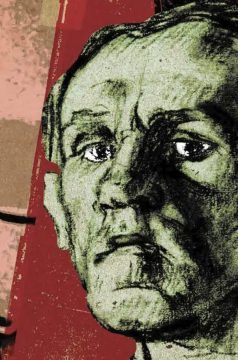Becca Rothfeld in The Nation:
 The life of the Polish Jewish author Bruno Schulz was, by pedestrian measures, a small one. It ended prematurely in 1942, when he was murdered in the street at the age of 50 by a Gestapo officer, and it was almost entirely confined to his provincial hometown of Drohobycz. Schulz drew compulsively, and in his brooding sketches crammed big-headed figures into cramped frames and rooms with low, clutching ceilings. Schulz himself was short and hunched. In photographs, he glowers. “He was small, strange, chimerical, focused, intense, almost feverish,” a friend, the Polish novelist Witold Gombrowicz, recalled in a diary entry. His fiction, too, was small and strange. Schulz’s surviving output consists of just two collections of short fiction, some letters, a few essays, and a handful of stray stories. His longest work spans about 150 pages.
The life of the Polish Jewish author Bruno Schulz was, by pedestrian measures, a small one. It ended prematurely in 1942, when he was murdered in the street at the age of 50 by a Gestapo officer, and it was almost entirely confined to his provincial hometown of Drohobycz. Schulz drew compulsively, and in his brooding sketches crammed big-headed figures into cramped frames and rooms with low, clutching ceilings. Schulz himself was short and hunched. In photographs, he glowers. “He was small, strange, chimerical, focused, intense, almost feverish,” a friend, the Polish novelist Witold Gombrowicz, recalled in a diary entry. His fiction, too, was small and strange. Schulz’s surviving output consists of just two collections of short fiction, some letters, a few essays, and a handful of stray stories. His longest work spans about 150 pages.
But these slim volumes have earned Schulz a soaring stature. In death, he has been enlarged beyond the bounds of his claustrophobic biography. He was beloved by John Updike, V.S. Pritchett, I.B. Singer, and Czesław Miłosz. He has been the subject of novelistic homages by Cynthia Ozick (The Messiah of Stockholm), Philip Roth (The Prague Orgy), and David Grossman (See Under: Love).
Long before his acolytes brought him back to life, however, Schulz was busy resurrecting himself.
More here.
